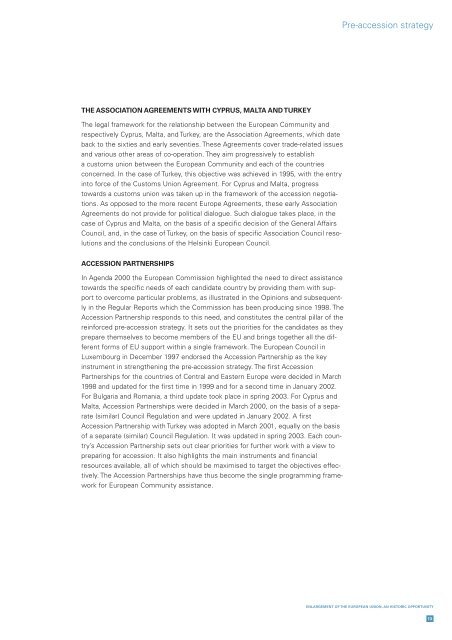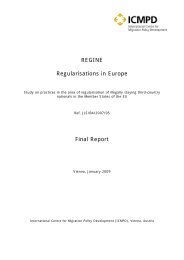European Union Enlargement - An historic opportunity
European Union Enlargement - An historic opportunity
European Union Enlargement - An historic opportunity
Create successful ePaper yourself
Turn your PDF publications into a flip-book with our unique Google optimized e-Paper software.
Pre-accession strategy<br />
THE ASSOCIATION AGREEMENTS WITH CYPRUS, MALTA AND TURKEY<br />
The legal framework for the relationship between the <strong>European</strong> Community and<br />
respectively Cyprus, Malta, and Turkey, are the Association Agreements, which date<br />
back to the sixties and early seventies. These Agreements cover trade-related issues<br />
and various other areas of co-operation. They aim progressively to establish<br />
a customs union between the <strong>European</strong> Community and each of the countries<br />
concerned. In the case of Turkey, this objective was achieved in 1995, with the entry<br />
into force of the Customs <strong>Union</strong> Agreement. For Cyprus and Malta, progress<br />
towards a customs union was taken up in the framework of the accession negotiations.<br />
As opposed to the more recent Europe Agreements, these early Association<br />
Agreements do not provide for political dialogue. Such dialogue takes place, in the<br />
case of Cyprus and Malta, on the basis of a specific decision of the General Affairs<br />
Council, and, in the case of Turkey, on the basis of specific Association Council resolutions<br />
and the conclusions of the Helsinki <strong>European</strong> Council.<br />
ACCESSION PARTNERSHIPS<br />
In Agenda 2000 the <strong>European</strong> Commission highlighted the need to direct assistance<br />
towards the specific needs of each candidate country by providing them with support<br />
to overcome particular problems, as illustrated in the Opinions and subsequently<br />
in the Regular Reports which the Commission has been producing since 1998. The<br />
Accession Partnership responds to this need, and constitutes the central pillar of the<br />
reinforced pre-accession strategy. It sets out the priorities for the candidates as they<br />
prepare themselves to become members of the EU and brings together all the different<br />
forms of EU support within a single framework. The <strong>European</strong> Council in<br />
Luxembourg in December 1997 endorsed the Accession Partnership as the key<br />
instrument in strengthening the pre-accession strategy. The first Accession<br />
Partnerships for the countries of Central and Eastern Europe were decided in March<br />
1998 and updated for the first time in 1999 and for a second time in January 2002.<br />
For Bulgaria and Romania, a third update took place in spring 2003. For Cyprus and<br />
Malta, Accession Partnerships were decided in March 2000, on the basis of a separate<br />
(similar) Council Regulation and were updated in January 2002. A first<br />
Accession Partnership with Turkey was adopted in March 2001, equally on the basis<br />
of a separate (similar) Council Regulation. It was updated in spring 2003. Each country’s<br />
Accession Partnership sets out clear priorities for further work with a view to<br />
preparing for accession. It also highlights the main instruments and financial<br />
resources available, all of which should be maximised to target the objectives effectively.<br />
The Accession Partnerships have thus become the single programming framework<br />
for <strong>European</strong> Community assistance.<br />
ENLARGEMENT OF THE EUROPEAN UNION, AN HISTORIC OPPORTUNITY<br />
13

















